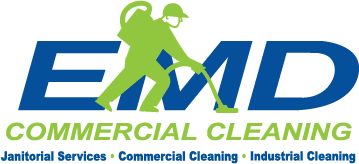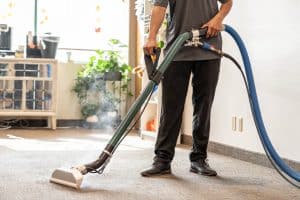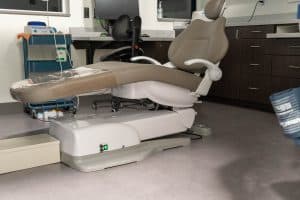Commercial spaces endure daily wear and tear, especially on their floors. Whether it’s an office building, healthcare facility, retail store, or industrial warehouse, floor maintenance is crucial. Despite its importance, many businesses underestimate the impact that neglected floors can have.
At EMD Cleaning, we believe that preventive maintenance is not just about cleanliness but also about cost control, safety, and reputation management. In this comprehensive guide, we’ll explore the hidden costs of poor commercial floor maintenance and how proactive care can protect your business.
1. Increased Risk of Accidents and Liability
Slippery floors, loose tiles, frayed carpets, and debris increase the likelihood of slips, trips, and falls. According to the National Safety Council, slips and falls are the second leading cause of workplace injuries. An injury lawsuit or workers’ compensation claim can easily cost a business thousands of dollars in legal fees and settlements. Consistent maintenance, including professional janitorial cleaning, reduces these risks and ensures regulatory compliance with safety standards such as OSHA.
2. Accelerated Wear and Tear
Foot traffic, dirt, and spills can degrade even the most durable flooring materials. Without regular sweeping, mopping, and refinishing, surfaces like hardwood, vinyl, tile, and concrete will deteriorate faster. Replacing an entire floor system due to premature wear can be prohibitively expensive. Regular cleaning and protective treatments, such as floor stripping and waxing, extend the life of flooring materials.
Types of Flooring and Their Maintenance Needs
- Hardwood: Requires regular dusting, damp mopping, and occasional refinishing.
- Carpet: Needs frequent vacuuming and periodic deep cleaning. Consider carpet cleaning services.
- Tile and Grout: Prone to staining; requires scrubbing and sealing. Check out our tile and grout cleaning.
- Vinyl and Laminate: Should be kept free from standing water and cleaned with approved solutions.
3. Decreased Employee Productivity and Morale
A clean workspace improves employee morale and reduces absenteeism. Dirty or damaged floors contribute to poor indoor air quality, spreading allergens and bacteria, which can lead to respiratory issues and increased sick leave. Employees take pride in working in a professional, well-kept environment. Clean floors contribute to an atmosphere that promotes focus, collaboration, and satisfaction.
4. Negative Customer Perception
Customers and clients form opinions instantly. Walking into a facility with dirty or damaged floors can create a lasting negative impression. This may result in lost business opportunities and damage to your brand reputation. Clean, shiny, and safe floors reflect a commitment to excellence and professionalism.
Industries Where Appearance Matters Most
- Retail: Customers equate cleanliness with product quality.
- Healthcare: Patient safety and infection control depend on sanitary floors. We offer specialized medical clinic cleaning.
- Hospitality: Guest satisfaction starts with visual appeal.
5. Higher Long-Term Cleaning and Restoration Costs
Allowing dirt, grime, and stains to accumulate means more intensive and expensive restorative cleaning down the line. For example, neglected carpets may require full replacement rather than a simple deep clean. Routine maintenance, such as stripping and waxing hard floors or regularly deep cleaning carpets, minimizes long-term expenses.
6. Compliance and Health Hazards
Industries with regulatory oversight—including healthcare, education, and food services—must comply with strict cleanliness standards. Failure to maintain clean floors could result in fines, inspections, or even closure. Unclean floors also pose biological hazards by harboring bacteria, mold, or viruses.
Compliance Standards to Consider
- OSHA: Occupational safety requirements for preventing workplace hazards.
- CDC: Cleanliness guidelines for infection prevention.
- ADA: Flooring must meet requirements for traction and accessibility.
To help meet these stringent standards, EMD Cleaning offers commercial cleaning services across multiple industries.
7. Reduced Property Value
Damaged, stained, or outdated flooring can significantly reduce a property’s market value. Investors and potential tenants will factor in the cost of floor replacement when negotiating leases or purchase agreements. Preventive care maintains your property’s appeal and avoids unnecessary devaluation.
8. Environmental Impact of Neglected Floors
Neglected floors often require replacement sooner, leading to the disposal of large volumes of carpet, wood, or vinyl—contributing to landfill waste. Regular maintenance reduces the frequency of floor replacement, helping businesses reduce their environmental footprint and support sustainability initiatives.
Learn more about responsible practices and maintenance plans at our commercial cleaning resources.
The hidden costs of neglecting commercial floor maintenance are far greater than the price of routine cleaning. From liability risks and employee health to brand perception and long-term expenses, failing to maintain floors can be financially and reputationally damaging.
At EMD Cleaning, we provide tailored floor maintenance programs to suit every type of commercial property. Our services protect your investment, enhance safety, and ensure your business always looks its best.
Visit EMD Cleaning to learn more and schedule a consultation to safeguard your floors and your bottom line.




